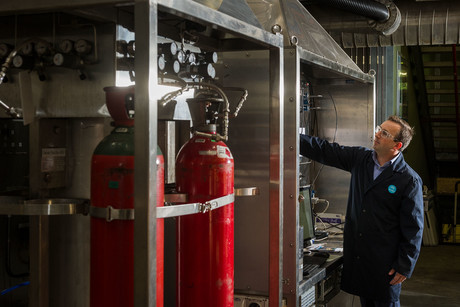CSIRO technology to make commercial hydrogen fuel feasible

Currently, the transportation and storage of hydrogen is complex and relatively expensive, making export commercially challenging. Now, CSIRO research will fill a gap in the global energy technology chain to supply fuel cell vehicles with low-emissions hydrogen sourced from Australia.
The two-year project will build on CSIRO’s expertise in separating pure hydrogen from mixed gas streams, in this case converting ammonia to high-purity hydrogen for use in fuel cell vehicles (FCVs). CSIRO’s membrane reactor technology will fill the gap between hydrogen production, distribution and delivery in the form a modular unit that can be used at or near a refuelling station.
The membrane will allow hydrogen to be transported in the form of ammonia (which is already being traded globally), then reconverted back to hydrogen at the point of use. The thin metal membrane allows hydrogen to pass while blocking all other gases.
Now in the final stages of development, the device is being further refined, ready for commercial deployment.
Recent advances in solar and electrochemical technologies means renewable hydrogen production is expected to become competitive with fossil fuel-based production, providing an opportunity to decarbonise both the energy and transport sectors while creating new export opportunities.
While Australia is a relatively small hydrogen market, the fuel can be distributed to emerging markets in Japan, South Korea and Europe using existing infrastructure.
CSIRO Chief Executive Dr Larry Marshall is excited by the prospect of a growing global market for clean hydrogen, and the potential for a national renewable hydrogen export industry, to benefit Australia.
“This is a watershed moment for energy, and we look forward to applying CSIRO innovation to enable this exciting renewably sourced fuel and energy storage medium a smoother path to market,” said Marshall. “I’m delighted to see strong collaboration and the application of CSIRO know-how to what is a key part of the overall energy mix.”
Chair of Renewable Hydrogen Brett Cooper believes CSIRO’s membrane technology can enable a new, and potentially carbon-free, export industry for Australia that could match the scale of the current LNG industry.
“With this technology, we can now deliver our renewable energy to Japan, Korea and across the Asia–Pacific region in liquid form, as renewable ammonia, and efficiently convert it back to pure hydrogen for cars, buses, power generation and industrial processes,” said Cooper. “This market didn't exist 10 years ago — now Australia is positioned to be the number one renewable fuel provider in the world’s fastest growing region.”

Toyota Motor Corporation Australia’s senior executive advisor to the board, Bernie O’Connor, affirmed Toyota’s commitment to reducing emissions and supporting hydrogen FCVs.
“Research into making hydrogen more accessible in the future for fuel and energy storage is key to the success of this technology,” he said. “CSIRO is at the forefront of this research and we will continue to work with them in the future so that we can roll out this technology.”
Hyundai Motor Company Australia’s manager of corporate communications, Scott Nargar, is also supportive of CSIRO’s hydrogen membrane technology advances.
“As a global leader in hydrogen-powered passenger vehicles, Hyundai fully supports any initiative which makes hydrogen more practical and easier to distribute,” said Nargar. “We applaud CSIRO’s expertise in this field and look forward to supporting its endeavours in the future.”
In addition to its membrane technology, CSIRO will apply its expertise to all stages of the technology chain (including solar photovoltaics, solar thermal, grid management, water electrolysis, ammonia synthesis, direct ammonia utilisation via combustion and/or fuel cells, and hydrogen production).
The project recently received $1.7 million from the Science and Industry Endowment Fund (SIEF), which will be matched by CSIRO.
JCU develops 'world first' bendable ceramic
James Cook University has announced that its engineers have developed a groundbreaking bendable...
Bayan licenses Australian solar cell recycling technology
Bayan Mining and Minerals has announced that it has reached an agreement to exclusively license...
Nuclear places Australia's aluminium smelters at risk: analysis
Analysis commissioned by Renew Australia for All has warned that prioritising nuclear energy over...








